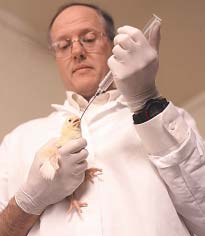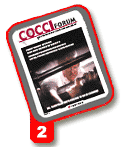COCCI People - Dr Harry Danforth
Dr. Harry Danforth has devoted his career to controlling coccidiosis in poultry

Dr. Harry Danforth
|
Asatisfying life's work sometimes
comes about by
chance, and so it has been
for Dr. Harry Danforth, a research
microbiologist who has made
invaluable contributions to the control
of coccidiosis in poultry.
It started when he was a college
undergraduate and found a course in
parasitology to be particularly interesting.
Danforth was fascinated by the
interaction between parasites and their
host.
Parasites in humans might have
been just as interesting, but as he pursued
his higher education, including a
Ph.D. in biology, "I met people in the
field of veterinary parasitology willing
to take on a young kid," he recalls.
"The veterinary part came about by
chance."
Since 1980, Danforth has been with
the United States Department of
Agriculture. He currently works at the
Parasite Biology and Epidemiology
Laboratory in Beltsville, Md., outside
Washington, D.C., and lives nearby
with wife Charla.
Works Enabled Vaccine Development
Danforth's accomplishments as a scientist
have been impressive. He has published
over 200 peer-reviewed manuscripts,
book chapters and abstracts
and currently holds 13 cooperative
research agreements with vaccine and
pharmaceutical companies.
He has extensively researched monoclonal
antibodies against avian coccidia
and is credited with developing
the first genetically engineered antigen
that provides immunity against coccidiosis
affecting poultry.
"It was the production of monoclonal
antibodies against parasites that
made it possible to produce antibodies
that would trigger an immune response
to coccidia in chickens," says Danforth.
"Then we started to work with the
delivery of live coccidia vaccines. We
found that you could use drug-sensitive
coccidia to vaccinate birds and change
the sensitivity of the coccidia on the
floor of growout houses," he says.
As far back as the 1970s, Danforth
says he foresaw that the effectiveness
of anticoccidials could be problematic.
"Ionophores were emerging and they
were effective, but coccidia had already
shown resistance to all other drugs for
coccidiosis. I figured it was a matter of
time before resistance also occurred
with the ionophores, and that immunology
was the future of coccidiosis
control," Danforth says.
Recent research by Danforth has
demonstrated that vaccinating with a
live oocyst vaccine renews the sensitivity
of coccidia to the widely used
ionophore salinomycin.
Vaccination also changes the composition
of oocysts in the field and their
ability to cause intestinal damage, his
research shows. For example, after the
use of Coccivac-B, a live-oocyst vaccine,
an aggressive Eimeria tenella
strain disappeared altogether, and
lesions due to other species of Eimeria
were minimized.
Predicts Change
Many poultry producers are not using
coccidiosis vaccines, Danforth says,
because they can still control coccidiosis
with in-feed anticoccidials. But he
believes that's going to change with
time.
"In-feed anticoccidials have been
good over the years and are simple to
use. You just mix it into feed at the feed
mill and treat flocks across the board.
"But resistance has become even
more of a problem and there are no
new anticoccidials being produced.
Producers are going to look to vaccines
to control coccidiosis. Vaccination is a
good adjunct to anticoccidial treatment,"
he says.
Initially, producers may not depend
entirely on vaccines, but more will at
least incorporate vaccination into their
coccidiosis control programs, he says.
"In the immediate future, there will be
more vaccination with live oocysts and,
further into the future, other types of
coccidiosis vaccines."
Consumer demand for birds raised
without drugs will contribute to the
trend to vaccinate and capitalize on
natural immunity, although in the
United States, that demand isn't as
strong yet as it is in Europe, Danforth
says.
Down the road, as there is a greater
understanding of how vaccines work,
he says, the pendulum will swing and
vaccination will be the primary way
that poultry producers control coccidiosis,
he predicts.
Clear Mission
Today, Danforth is spending more time
in an office directing research than he
is in the lab. It's a far cry from the small
farming community in Illinois where he
grew up, but Danforth says he gets out
as often as possible to visit with poultry
producers, particularly in the nearby
Delmarva Peninsula, and with veterinarians
in charge of flock health.
Whether he's in the office or the lab,
however, Danforth says he likes his
work, and his mission to advance the
science of coccidiosis management.
Coccidiosis research, he says, gives
poultry producers new direction and
possibilities for coccidiosis control. "It
helps them take the technology we
have and apply it so we will continue
to have good flock performance and
control of a potentially economically
devastating disease."
One of the reasons further advancements
in coccidiosis control can be
expected, says Danforth, is due to the
attitude of the poultry industry.
"I applaud the poultry industry for
its willingness to try new things," he
says. "People in the industry are highly
progressive. They are always open to
new ideas and are highly adaptable. I
find that refreshing. I really want to
thank them for their cooperative attitude."
Editor's note: This is the first in a series
of features about professionals who are
making important contributions in the
field of coccidiosis control.
Source: CocciForum Issue No.2, Schering-Plough Animal Health.







